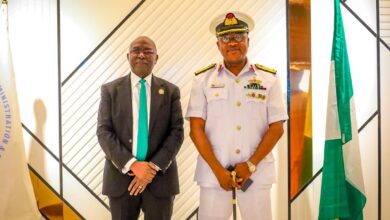
In order for Nigeria to enjoy the full benefit of the African Continental Free Trade Area (AfCFTA) agreement, the government has been tasked to upgrade the country’s borders to SMART ones for seamless transborder trade.
Former National President of the Association of Nigerian Licensed Customs Agent (ANLCA), Anthony Iju Nwabunike made the call at the 2023 annual Association of Maritime Journalists of Nigeria (AMJON) conference and awards in Lagos on Thursday.
Delivering a paper titled: “The role of the Customs Brokers in Sustaining a Viable Transborder Trade for National Economic Growth”, Nwabunike, who was represented by Barrister Ikechukwu Ukadike stated that Nigeria’s borders are devoid of equipment required of modern day land borders.
His words: “Trade itself is dynamic and influenced by state policies regulating import, export and manufacturing or agriculture. What is allowed in one country could be prohibited in another country
“Whereas the World Customs Organisation (WCO) supports the concept of SMART borders for seamless Trade, Travel and Transport. Nigeria is yet to achieve SMART borders in the real sense of it.
“Nigeria being an Anglophone (English speaking ) country is surrounded by neighbors that are predominantly (Francophone) French speaking, which on its own is a challenge when it comes to trade dialogues.
“WCO Members are encouraged to look at how they can strengthen their endeavour to facilitate trade and travel, whilst mitigating threats inherent in the cross-border flows of goods, people, and means of transport.
“Our “SMART” acronym stems from the following guiding principles: Secure, Measurable, Automated, Risk Management-based, and Technology-driven.
“The rapid and safe movement of people and goods across borders encourages trade, travel and transport, and Customs has the dual task of facilitating this flow while securing it. This is no easy task and Customs is expected to be focused and determined to achieve its goal”.
Commenting further on the peculiar nature of Nigerian borders, the maritime consultant noted that the country is still grappling with security in some border states, especially in the northern part of the country.
He said due to inadequate technology for monitoring and evaluation, there has not been accurate template for measurements of the degrees of trade.
Nwabunike, who explained that one of the roles of Customs brokers includes revenue generation, reiterated his call to the government to consider giving a percentage through statutory provisions to the customs broker.
According to the pioneer chairman of the Council for the Regulation of Freight Forwarding in Nigeria (CRFFN) this will solidify their stake and would enhance productivity as their benefits would be dependent on what they make for the government.
“Over 70 percent of revenue made by government through its agencies from import and export activities have direct and indirect participation of the freight forwarders.
“For 2024, the Comptroller General of Nigeria Customs Service recently said the service aims to collect N6tr for government. Over 4tr of this projected collection will likely be made through customs brokers.
“This is why I would like to reiterate my call to government to consider giving a percentage through statutory provisions to the customs broker. This will be a win-win for government and the brokers as more revenue would be collected. It will also reduce the stress of deploying risk management tools like post clearance audits, alerts and demand notices (DN) to prevent revenue loss”, he said.
Nwabunike also commended AMJON for leading the way for discourse on critical areas of the economic and social life.





